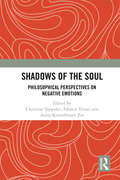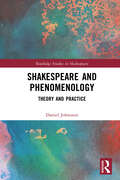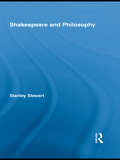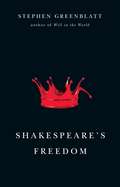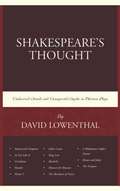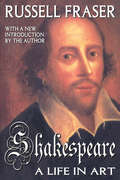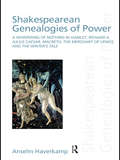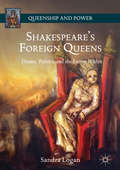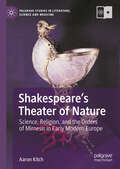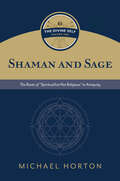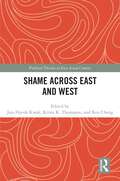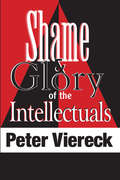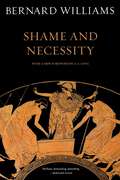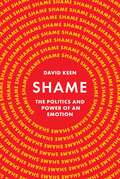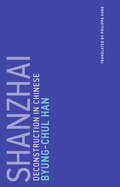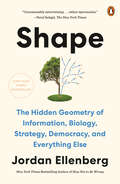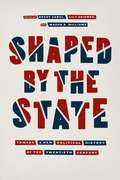- Table View
- List View
Shadows of the Soul: Philosophical Perspectives on Negative Emotions
by Anita Konzelmann Ziv Fabrice Teroni Christine TappoletNegative emotions are familiar enough, but they have rarely been a topic of study in their own right. This volume brings together fourteen chapters on negative emotions, written in a highly accessible style for non-specialists and specialists alike. It starts with chapters on general issues raised by negative emotions, such as the nature of valence, the theoretical implications of nasty emotions, the role of negative emotions in fiction, as well as the puzzles raised by ambivalent and mixed emotions. The second part of the volume consists of studies of specific emotional phenomena, ranging from the emotion of being moved and the sense of uncanniness to jealousy, hatred, shame, contempt, anxiety, and grief.
Shakespeare and Interpretation, or What You Will
by Brayton PolkaBrayton Polka takes both a textual and theoretical approach to seven plays of Shakespeare: Macbeth, Othello, Twelfth Night, All’s Well That Ends Well, Julius Caesar, Troilus and Cressida, and Hamlet. He calls upon the Bible and the ideas of major European thinkers, above all, Kierkegaard and Spinoza, to argue that the concept of interpretation that underlies both Shakespeare’s plays and our own lives as moderns is the golden rule of the Bible: the command to love your neighbor as yourself. What you will (the alternative title of Twelfth Night ) thus captures the idea that interpretation is the very act by which we constitute our lives. For it is only in willing what others will—in loving relationships—that we enact a concept of interpretation that is adequate to our lives. Polka argues that it is the aim of Shakespeare, when representing the ancient world in plays like Julius Caesar and Troilus and Cressida, and also in his long narrative poem “The Rape of Lucrece,” to dramatize the fundamental differences between ancient (pagan) values and modern (biblical) values or between what he articulates as contradiction and paradox. The ancients are fatally destroyed by the contradictions of their lives of which they remain ignorant. In contrast, we moderns in the biblical tradition, like those who figure in Shakespeare’s other works, are responsible for addressing and overcoming the contradictions of our lives through living the interpretive paradox of “what you will,” of treating all human beings as our neighbor. Shakespeare’s comedies and tragedies, notwithstanding their dramatically different form, share this interpretive framework of paradox. As the author shows in his book, texts without interpretation are blind and interpretation without texts is empty. Published by University of Delaware Press. Distributed worldwide by Rutgers University Press.
Shakespeare and Phenomenology: Theory and Practice (Routledge Studies in Shakespeare)
by Daniel JohnstonThis book considers how Shakespeare’s theatre investigates and reveals “Being-in-the-world”. Through the lens of phenomenology (the study of how the world shows itself to conscious experience) Johnston examines how Shakespeare’s texts and dramaturgy reveal aspects of Being. This volume explores philosophical themes in Shakespeare’s drama, including perceptions of stage space and fictional place, temporality, bodies, authenticity, and memory in early modern English staging. It examines how Shakespeare asks the question of the meaning of Being by playing with the distinction between “what is” and “what is not”. The work offers practical performance tips and exercises to connect with modern audiences. Each chapter aims to inspire creative artists in production and rehearsal through a unique focus and provide a critical approach to performance. Through a phenomenological exploration of dramatic possibilities drawn from the key concepts of philosophers such as Edmund Husserl, Martin Heidegger, Maurice Merleau-Ponty, and Edith Stein, Johnston investigates theatre as a practical form of philosophical investigation. Theatre-makers should not only consider the fictional world of the play, but also the historical context of Shakespeare’s world and the contemporary context for connecting with audiences here, today, now.
Shakespeare and Philosophy (Routledge Studies in Shakespeare)
by Stanley StewartTouching on the work of philosophers including Richardson, Kant, Hume, Wittgenstein, Nietzsche, and Dewey, this study examines the history of what philosophers have had to say about "Shakespeare" as a subject of philosophy, from the seventeenth-century to the present. Stewart's volume will be of interest to Shakespeareans, literary critics, and philosophers.
Shakespeare as a Way of Life: Skeptical Practice and the Politics of Weakness
by James KuznerShakespeare as a Way of Life shows how reading Shakespeare helps us to live with epistemological weakness and even to practice this weakness, to make it a way of life. In a series of close readings, Kuzner shows how Hamlet, Lucrece, Othello, The Winter’s Tale, The Tempest, and Timon of Athens, impel us to grapple with basic uncertainties: how we can be free, whether the world is abundant, whether we have met the demands of love and social life.To Kuzner, Shakespeare’s skepticism doesn’t have the enabling potential of Keats’s heroic “negativity capability,” but neither is that skepticism the corrosive disease that necessarily issues in tragedy. While sensitive to both possibilities, Kuzner offers a way to keep negative capability negative while making skepticism livable. Rather than light the way to empowered, liberal subjectivity, Shakespeare’s works demand lasting disorientation, demand that we practice the impractical so as to reshape the frames by which we view and negotiate the world.The act of reading Shakespeare cannot yield the practical value that cognitive scientists and literary critics attribute to it. His work neither clarifies our sense of ourselves, of others, or of the world; nor heartens us about the human capacity for insight and invention; nor sharpens our ability to appreciate and adjudicate complex problems of ethics and politics. Shakespeare’s plays, rather, yield cognitive discomforts, and it is just these discomforts that make them worthwhile.
Shakespeare mit Hegel: Von „Hamlet“ zu „Othello“ und „Lear“ (Abhandlungen zur Literaturwissenschaft)
by Anselm HaverkampShakespeare mit Hegel nimmt die gemeinsame Wurzel von Literatur und Philosophie beim Wort. Aus Hegels Lektüre Shakespeares erwächst in der Phänomenologie des Geistes ein neuer, dialektischer Begriff von Geschichte, der in nuce bereits ein ‚negativ dialektischer&‘ ist und bei Adorno zu Anlass, Ärgernis und Hoffnung Ästhetischer Theorie wird. Die begriffliche Ausarbeitung der seit Hegels Ästhetik immer neu diskutierten dialektischen Natur der Kunst ist in Hegels Rezeption Shakespeares nicht nur generell nachzuweisen, sondern wird hier in der buchstaben-genauen Lektüre, die Hegel praktiziert hat, aber von Philosophen kaum beachtet worden ist, identifiziert und in ihren Voraussetzungen und Konsequenzen nachgezeichnet. Herauskommt dabei ein anderer Hegel und ein neuer, historisch spektakulärer Shakespeare. Es handelt sich bei diesem Buch um eine in konzentrierten Analysen enggeführte, historisch konkretisierte Zusammenführung und Neusituierung der Schnittstellen eines philosophischen und literaturwissenschaftlichen Erkenntnisinteresses, als dessen letzter, Hegel weiterführender, aber aporetisch schwieriger Gesamtentwurf Adornos Ästhetische Theorie neu zu lesen ist.
Shakespeare para enamorados (Genios para la vida cotidiana #Volumen)
by Allan PercyRemedios eficaces para gozar del amor cada día de tu vida. Shakespeare para enamorados es un libro fresco e increíblemente inspirador para los que se toman el amor muy en serio. De entre todos los grandes autores de la literatura universal, ninguno profundizó en los misterios del amor y ha tratado los asuntos del corazón desde una perspectiva tan lúcida como William Shakespeare. Todavía hoy sus obras y poemas son una poderosa herramienta para comprender los insondables secretos de nuestro corazón. Del flechazo al desengaño, del primer beso al amor imposible, del compromiso a los celos, Shakespeare para enamorados saca de los escenarios y de las antologías poéticas la ciencia shakespeariana del amor para iluminar nuestra vida cotidiana y por fin dar respuesta a preguntas como: ¿Por qué hay personas que tienen mala suerte en las relaciones sentimentales? ¿Cómo se cura el mal de amores? ¿Se puede vivir un romance toda la vida? ¿Cuál es el secreto de la seducción? ¿Cómo luchar contra los celos?
Shakespeare's Folly: Philosophy, Humanism, Critical Theory (Routledge Studies in Shakespeare)
by Sam HallThis study contends that folly is of fundamental importance to the implicit philosophical vision of Shakespeare’s drama. The discourse of folly’s wordplay, jubilant ironies, and vertiginous paradoxes furnish Shakespeare with a way of understanding that lays bare the hypocrisies and absurdities of the serious world. Like Erasmus, More, and Montaigne before him, Shakespeare employs folly as a mode of understanding that does not arrogantly insist upon the veracity of its own claims – a fool’s truth, after all, is spoken by a fool. Yet, as this study demonstrates, Shakespearean folly is not the sole preserve of professional jesters and garrulous clowns, for it is also apparent on a thematic, conceptual, and formal level in virtually all of his plays. Examining canonical histories, comedies, and tragedies, this study is the first to either contextualize Shakespearean folly within European humanist thought, or to argue that Shakespeare’s philosophy of folly is part of a subterranean strand of Western philosophy, which itself reflects upon the folly of the wise. This strand runs from the philosopher-fool Socrates through to Montaigne and on to Nietzsche, but finds its most sustained expression in the Critical Theory of the mid to late twentieth-century, when the self-destructive potential latent in rationality became an historical reality. This book makes a substantial contribution to the fields of Shakespeare, Renaissance humanism, Critical Theory, and Literature and Philosophy. It illustrates, moreover, how rediscovering the philosophical potential of folly may enable us to resist the growing dominance of instrumental thought in the cultural sphere.
Shakespeare's Freedom
by Stephen GreenblattShakespeare lived in a world of absolutes—of claims for the absolute authority of scripture, monarch, and God, and the authority of fathers over wives and children, the old over the young, and the gentle over the baseborn. With the elegance and verve for which he is well known, Stephen Greenblatt, author of the best-selling Will in the World, shows that Shakespeare was strikingly averse to such absolutes and constantly probed the possibility of freedom from them. Again and again, Shakespeare confounds the designs and pretensions of kings, generals, and churchmen. His aversion to absolutes even leads him to probe the exalted and seemingly limitless passions of his lovers. Greenblatt explores this rich theme by addressing four of Shakespeare’s preoccupations across all the genres in which he worked. He first considers the idea of beauty in Shakespeare’s works, specifically his challenge to the cult of featureless perfection and his interest in distinguishing marks. He then turns to Shakespeare’s interest in murderous hatred, most famously embodied in Shylock but seen also in the character Bernardine in Measure for Measure. Next Greenblatt considers the idea of Shakespearean authority—that is, Shakespeare’s deep sense of the ethical ambiguity of power, including his own. Ultimately, Greenblatt takes up Shakespearean autonomy, in particular the freedom of artists, guided by distinctive forms of perception, to live by their own laws and to claim that their creations are singularly unconstrained. A book that could only have been written by Stephen Greenblatt, Shakespeare’s Freedom is a wholly original and eloquent meditation by the most acclaimed and influential Shakespearean of our time.
Shakespeare's Thought: Unobserved Details And Unsuspected Depths In Thirteen Plays
by David LowenthalApart from the dedicatory poem, this edition adds six new chapters to the original and sets forth under a new title that is a somewhat better guide to these pages than the old one (Shakespeare and the Good Life: Ethics and Politics in Dramatic Form). For attention to detail, I've been inspired by Thomas de Quincey's astonishing claim (in his "On the Knocking on the Door in Macbeth") that absolutely nothing in a Shakespearean play is there by accident.
Shakespeare: A Life in Art
by Russell FraserShakespeare: A Life in Art brings together in a single volume Fraser's previously published two-volume biography (Young Shakespeare, 1988, and Shakespeare: The Later Years, 1992). This volume includes a new introduction, which looks back on the author's lifelong commitment to Shakespeare's work and seeks to find the pattern in his carpet.Fraser's approach places Shakespeare's work first but shows how the life and art interpenetrate, like the yolk and white of one shell. What Shakespeare was doing in Stratford and London underlies what he was writing, or more exactly, the two flow together. Most of the book is devoted to Shakespeare the man and artist, but it simultaneously throws light on his literary and personal relations with contemporaries such as Jonson, Marlowe, and others known as the University Wits. His experience as an actor and man of theater is absorbingly recounted here, as well as his relations to well-born patrons like the Earl of Southampton and Henry Carey, Lord Hunsdon (England's Lord Chamberlain). In 1603 when James I ascended the throne, the Chamberlain's Men became the King's Men, passing under the sovereign's protection. How Shakespeare responded to his ambiguous role--he was both servant to the great and their remorseless critic--is another of Fraser's subjects. In short, Fraser's principal purpose is to advance our understanding of Shakespeare, at the same time throwing light on the work of the man who of all modern, and perhaps ancient poets had the largest and most comprehensive soul. John Dryden, Shakespeare's first great critic, said that, and Fraser tries to estimate what he meant.
Shakespearean Genealogies of Power: A Whispering of Nothing in Hamlet, Richard II, Julius Caesar, Macbeth, The Merchant of Venice, and The Winter’s Tale
by Anselm HaverkampShakespearean Genealogies of Power proposes a new view on Shakespeare’s involvement with the legal sphere: as a visible space between the spheres of politics and law and well able to negotiate legal and political, even constitutional concerns, Shakespeare’s theatre opened up a new perspective on normativity. His plays reflect, even create, "history" in a new sense on the premises of the older conceptions of historical and legal exemplarity: examples, cases, and instances are to be reflected rather than treated as straightforwardly didactic or salvific. Thus, what comes to be recognized, reflected and acknowledged has a disowning, alienating effect, whose enduring aftermath rather than its theatrical immediacy counts and remains effective. In Shakespeare, the law gets hold of its normativity as the problematic efficacy of unsolved – or rarely ever completely solved – problems: on the stage of the theatre, the law has to cope with a mortgage of history rather than with its own success story. The exemplary interplay of critical cultural and legal theory in the twentieth-century – between Carl Schmitt and Hans Kelsen, Walter Benjamin and Ernst Kantorowicz, Hans Blumenberg and Giorgio Agamben, Robert Cover and Niklas Luhmann – found in Shakespeare’s plays its speculative instruments.
Shakespearean Issues: Agency, Skepticism, and Other Puzzles
by Richard StrierIn Shakespearean Issues, Richard Strier has written a set of linked essays bound by a learned view of how to think about Shakespeare’s plays and also how to write literary criticism on them. The essays vary in their foci—from dealing with passages and key lines to dealing with whole plays, and to dealing with multiple plays in thematic conversation with each other. Strier treats the political, social, and philosophical themes of Shakespeare’s plays through recursive and revisionary close reading, revisiting plays from different angles and often contravening prevailing views.Part I focuses on characters. Moments of bad faith, of unconscious self-revelation, and of semi-conscious self-revelation are analyzed, along with the problem of describing characters psychologically and ethically. In an essay on “Happy Hamlet,” the famous melancholy of the prince is questioned, as is the villainy of Rosencrantz and Guildenstern, while another essay asks the reader to reconsider moral judgments and negative assessments of characters who may be flawed but do not seem obviously wicked, such as Edgar and Gloucester in King Lear.Part II moves to systems, arguing that Henry IV, Measure for Measure, and The Merchant of Venice raise doubts about fundamental features of legal systems, such as impartiality, punishments, and respect for contracts. Strier reveals King Lear’s radicalism, analyzing its concentration on poverty and its insistence on the existence and legitimacy of a material substratum to human life. Essays on The Tempest offer original takes on the play’s presentation of coercive power, of civilization and its discontents, and of humanist ideals. Part III turns to religious and epistemological beliefs, with Strier challenging prevailing views of Shakespeare’s relation to both.A culminating reading sees The Winter’s Tale as ultimately affirming the mind’s capacities, and as finding a place for something like religion within the world. Anyone interested in Shakespeare’s plays will find Shakespearean Issues bracing and thought-provoking.
Shakespeare’s Foreign Queens: Drama, Politics, And The Enemy Within (Queenship and Power)
by Sandra LoganThis book examines Shakespeare’s depiction of foreign queens as he uses them to reveal and embody tensions within early modern English politics. Linking early modern and contemporary political theory and concerns through the concepts of fragmented identity, hospitality, citizenship, and banishment, Sandra Logan takes up a set of questions not widely addressed by scholars of early modern queenship. How does Shakespeare’s representation of these queens challenge the opposition between friend and enemy that ostensibly defines the context of the political? And how do these queens expose the abusive potential of the sovereign? Focusing on Katherine of Aragon in Henry VIII, Hermione in The Winter’s Tale, Tamora in Titus Andronicus, and Margaret in the first history tetralogy, Logan considers them as means for exploring conditions of vulnerability, alienation, and exclusion common to subjects of every social position, exposing the sovereign himself as the true enemy of the state.
Shakespeare’s Theater of Nature: Science, Religion, and the Orders of Mimesis in Early Modern Europe (Palgrave Studies in Literature, Science and Medicine)
by Aaron KitchShakespeare’s Theater of Nature argues that Shakespeare combined art and nature in new ways while experimenting with relations between words, images, and objects as sources of knowledge and pleasure. Shakespeare’s re-centering of nature as a source of theatrical representation in a range of plays follows debates in natural philosophy and theology about how to understand divinity in and through the order of nature (ordo creationis). Early chapters analyze early modern reframing of nature by printed books of botany, cosmology, and history—as well Tudor interludes that center nature as a subject—while later chapters offer readings of eight plays by Shakespeare that draw on classical, medieval, and early modern debates in natural philosophy and theology to create new modes of dramatic mimesis.
Shaman and Sage: The Roots of “Spiritual but Not Religious” in Antiquity
by Michael HortonThe first volume of Michael Horton&’s magisterial intellectual history of &“spiritual but not religious&” as a phenomenon in Western culture Discussions of the rapidly increasing number of people identifying as &“spiritual but not religious&” tend to focus on the past century. But the SBNR phenomenon and the values that underlie it may be older than Christianity itself. Michael Horton reveals that the hallmarks of modern spirituality—autonomy, individualism, utopianism, and more—have their foundations in Greek philosophical religion. Horton makes the case that the development of the shaman figure in the Axial Age—particularly its iteration among Orphists—represented a &“divine self.&” One must realize the divinity within the self to break free from physicality and become one with a panentheistic unity. Time and time again, this tradition of divinity hiding in nature has arisen as an alternative to monotheistic submission to a god who intervenes in creation. This first volume traces the development of a utopian view of the human individual: a divine soul longing to break free from all limits of body, history, and the social and natural world. When the second and third volumes are complete, students and scholars will consult The Divine Self as the authoritative guide to the &“spiritual but not religious&” tendency as a recurring theme in Western culture from antiquity to the present.
Shamans and Robots: On Ritual, the Placebo Effect, and Artificial Consciousness (Univocal)
by Roger BartraA profound exploration of the external influences that shape human consciousness, from healing rituals to digital devices In this voyage through thousands of years of psychosomatic healing, distinguished anthropologist and sociologist Roger Bartra examines the placebo effect as a key to our understanding of human consciousness. Shamans and Robots demonstrates how biology and technology become intertwined within human culture by using the various histories of ritual and symbolic healing to speculate about future developments in artificial intelligence. Charting the extensive history of the placebo effect through medieval healing, shamanism, and early psychoanalytic practices, Bartra posits that consciousness is not simply the province of the mind but something equally shaped by external systems and objects. He finds evidence of this &“exocerebrum&”—the extension of our brains outside the body—in the shamanistic concept of the placebo, in which external objects heal our bodies, and in modern technical devices like prostheses or robots, whose development of a mechanical consciousness would have to mimic, and in turn elucidate, the processes involved in the creation of consciousness in humans. Through this radical concept, he analyzes digital media&’s relationship to the functions of the human brain and probes the possibility of artificial consciousness. Both a look at the human body&’s potential to restore itself and a profound reflection on the curative power of symbolic structures, Shamans and Robots explores how our technologies increasingly serve as extensions of our cognitive selves.
Shame Across East and West (Political Theories in East Asian Context)
by Jun-Hyeok Kwak Krista K. Thomason Ken ChengIn order to gain a deeper understanding of shame and shamelessness as ethico-political phenomena in the contemporary world, this book stages a cross-cultural dialogue that questions and unsettles established views.Expounding and evaluating a range of perspectives on shame, from the ancient Greeks and classical Confucians to modern liberalism, the chapters in this collection reflect on how we should understand the movement of shame from private morality into the collective sphere, and ask what role shame can or should play, as emotional support or ethical corrective, to the normative frameworks of social and political civility.Covering the prominent discourses of Western modernity, as well as non-Western, and oppositional traditions, this volume will be of interest to students and scholars in moral and political philosophy, contemporary democratic theory, and comparative philosophy.
Shame and Glory of the Intellectuals: Babbitt Jr. Vs. The Rediscovery Of Values
by Peter ViereckIn this classic volume, written at the height of the Cold War, with a new preface of 2006, Peter Viereck, one of the foremost intellectual spokesmen of modern conservatism, examines the differing responses of American and European intellectuals to the twin threats of Nazism and Soviet communism. In so doing, he seeks to formulate a humanistic conservatism with which to counter the danger of totalitarian thought in the areas of politics, ethics, and art.The glory of the intellectuals was the firm moral stance they took against Nazism at a time when appeasement was the preferred path of many politicians; their shame lay in their failure to recognize the brutality of Stalinism to the extent of becoming apologists for or accomplices of its tyranny. In Viereck's view, this failure is rooted in an abandonment of humane values that he sees as a legacy of nineteenth-century romanticism and certain strands of modernist thought and aesthetics.Among his targets are literary obscurantism as personified by Ezra Pound, the academicization of literary culture, the rigidity of adversarial avant-gardism, and the failure of many writers and cultural institutions to conserve the very heritage their political freedom and security depend on. Viereck represents their attitude in a series of satirical dialogues with Gaylord Babbitt, son of Sinclair Lewis' embodiment of conservative philistinism. Babbitt Junior is as unreflective as his father, but the objects of his credulity are the received ideas of liberal progressivism and avant-garde mandarinism. Ultimately, Viereck's critique stands as a timely rebuke to the extremism of both left and right.
Shame and Necessity, Second Edition (Sather Classical Lectures #57)
by Bernard WilliamsWe tend to suppose that the ancient Greeks had primitive ideas of the self, of responsibility, freedom, and shame, and that now humanity has advanced from these to a more refined moral consciousness. Bernard Williams's original and radical book questions this picture of Western history. While we are in many ways different from the Greeks, Williams claims that the differences are not to be traced to a shift in these basic conceptions of ethical life. We are more like the ancients than we are prepared to acknowledge, and only when this is understood can we properly grasp our most important differences from them, such as our rejection of slavery.The author is a philosopher, but much of his book is directed to writers such as Homer and the tragedians, whom he discusses as poets and not just as materials for philosophy. At the center of his study is the question of how we can understand Greek tragedy at all, when its world is so far from ours.Williams explains how it is that when the ancients speak, they do not merely tell us about themselves, but about ourselves. In a new foreword A.A. Long explores the impact of this volume in the context of Williams's stunning career.
Shame and Necessity: Volume 57 of Sather Classical Lectures
by Bernard WilliamsWe are more like the ancients than we are prepared to acknowledge, and only when this is understood can we properly grasp our most important differences from them, such as our rejection of slavery. The author is a philosopher, but much of his book is directed to writers such as Homer and the tragedians, whom he discusses as poets and not just as materials for philosophy. At the center of his study is the question of how we can understand Greek tragedy at all, when its world is so far from ours. Williams explains how it is that when the ancients speak, they do not merely tell us about themselves, but about ourselves. Shame and Necessity gives a new account of our relations to the Greeks, and helps us to see what ethical ideas we need in order to live in the modern world.
Shame: The Politics and Power of an Emotion
by David KeenThe uses of shame (and shamelessness) in spheres that range from social media and consumerism to polarized politics and mass violenceToday, we are caught in a shame spiral—a vortex of mutual shaming that pervades everything from politics to social media. We are shamed for our looks, our culture, our ethnicity, our sexuality, our poverty, our wrongdoings, our politics. But what is the point of all this shaming and countershaming? Does it work? And if so, for whom?In Shame, David Keen explores the function of modern shaming, paying particular attention to how shame is instrumentalized and weaponized. Keen points out that there is usually someone who offers an escape from shame—and that many of those who make this offer have been piling on shame in the first place. Self-interested manipulations of shame, Keen argues, are central to understanding phenomena as wide-ranging as consumerism, violent crime, populist politics, and even war and genocide. Shame is political as well as personal. To break out of our current cycle of shame and shaming, and to understand the harm that shame can do, we must recognize the ways that shame is being made to serve political and economic purposes.Keen also traces the rise of leaders on both sides of the Atlantic who possess a dangerous shamelessness, and he asks how shame and shamelessness can both be damaging. Answering this question means understanding the different types of shame. And it means understanding how shame and shamelessness interact—not least when shame is instrumentalized by those who are selling shamelessness. Keen points to a perverse and inequitable distribution of shame, with the victims of poverty and violence frequently being shamed, while those who benefit tend to exhibit shamelessness and even pride.
Shanzhai: Deconstruction in Chinese (Untimely Meditations #8)
by Byung-Chul HanTracing the thread of “decreation” in Chinese thought, from constantly changing classical masterpieces to fake cell phones that are better than the original.Shanzhai is a Chinese neologism that means “fake,” originally coined to describe knock-off cell phones marketed under such names as Nokir and Samsing. These cell phones were not crude forgeries but multifunctional, stylish, and as good as or better than the originals. Shanzhai has since spread into other parts of Chinese life, with shanzhai books, shanzhai politicians, shanzhai stars. There is a shanzhai Harry Potter: Harry Potter and the Porcelain Doll, in which Harry takes on his nemesis Yandomort. In the West, this would be seen as piracy, or even desecration, but in Chinese culture, originals are continually transformed—deconstructed. In this volume in the Untimely Meditations series, Byung-Chul Han traces the thread of deconstruction, or “decreation,” in Chinese thought, from ancient masterpieces that invite inscription and transcription to Maoism—“a kind a shanzhai Marxism,” Han writes.Han discusses the Chinese concepts of quan, or law, which literally means the weight that slides back and forth on a scale, radically different from Western notions of absoluteness; zhen ji, or original, determined not by an act of creation but by unending process; xian zhan, or seals of leisure, affixed by collectors and part of the picture's composition; fuzhi, or copy, a replica of equal value to the original; and shanzhai. The Far East, Han writes, is not familiar with such “pre-deconstructive” factors as original or identity. Far Eastern thought begins with deconstruction.
Shape: The Hidden Geometry of Information, Biology, Strategy, Democracy, and Everything Else
by Jordan EllenbergFrom the New York Times-bestselling author of How Not to Be Wrong—himself a world-class geometer—a far-ranging exploration of the power of geometry, which turns out to help us think better about practically everything. <P><P>How should a democracy choose its representatives? How can you stop a pandemic from sweeping the world? How do computers learn to play Go, and why is learning Go so much easier for them than learning to read a sentence? Can ancient Greek proportions predict the stock market? (Sorry, no.) What should your kids learn in school if they really want to learn to think? All these are questions about geometry. For real. <P><P>If you're like most people, geometry is a sterile and dimly remembered exercise you gladly left behind in the dust of ninth grade, along with your braces and active romantic interest in pop singers. If you recall any of it, it's plodding through a series of miniscule steps only to prove some fact about triangles that was obvious to you in the first place. That's not geometry. Okay, it is geometry, but only a tiny part, which has as much to do with geometry in all its flush modern richness as conjugating a verb has to do with a great novel. <P><P>Shape reveals the geometry underneath some of the most important scientific, political, and philosophical problems we face. Geometry asks: Where are things? Which things are near each other? How can you get from one thing to another thing? Those are important questions. The word "geometry," from the Greek for "measuring the world." If anything, that's an undersell. Geometry doesn't just measure the world—it explains it. Shape shows us how. <P><P><b>A New York Times Bestseller</b>
Shaped by the State: Toward a New Political History of the Twentieth Century
by Lily Geismer Mason B. Williams Brent CebulAmerican political history has been built around narratives of crisis, in which what “counts” are the moments when seemingly stable political orders collapse and new ones rise from the ashes. But while crisis-centered frameworks can make sense of certain dimensions of political culture, partisan change, and governance, they also often steal attention from the production of categories like race, gender, and citizenship status that transcend the usual break points in American history. Brent Cebul, Lily Geismer, and Mason B. Williams have brought together first-rate scholars from a wide range of subfields who are making structures of state power—not moments of crisis or partisan realignment—integral to their analyses. All of the contributors see political history as defined less by elite subjects than by tensions between state and economy, state and society, and state and subject—tensions that reveal continuities as much as disjunctures. This broader definition incorporates investigations of the crosscurrents of power, race, and identity; the recent turns toward the history of capitalism and transnational history; and an evolving understanding of American political development that cuts across eras of seeming liberal, conservative, or neoliberal ascendance. The result is a rich revelation of what political history is today.
